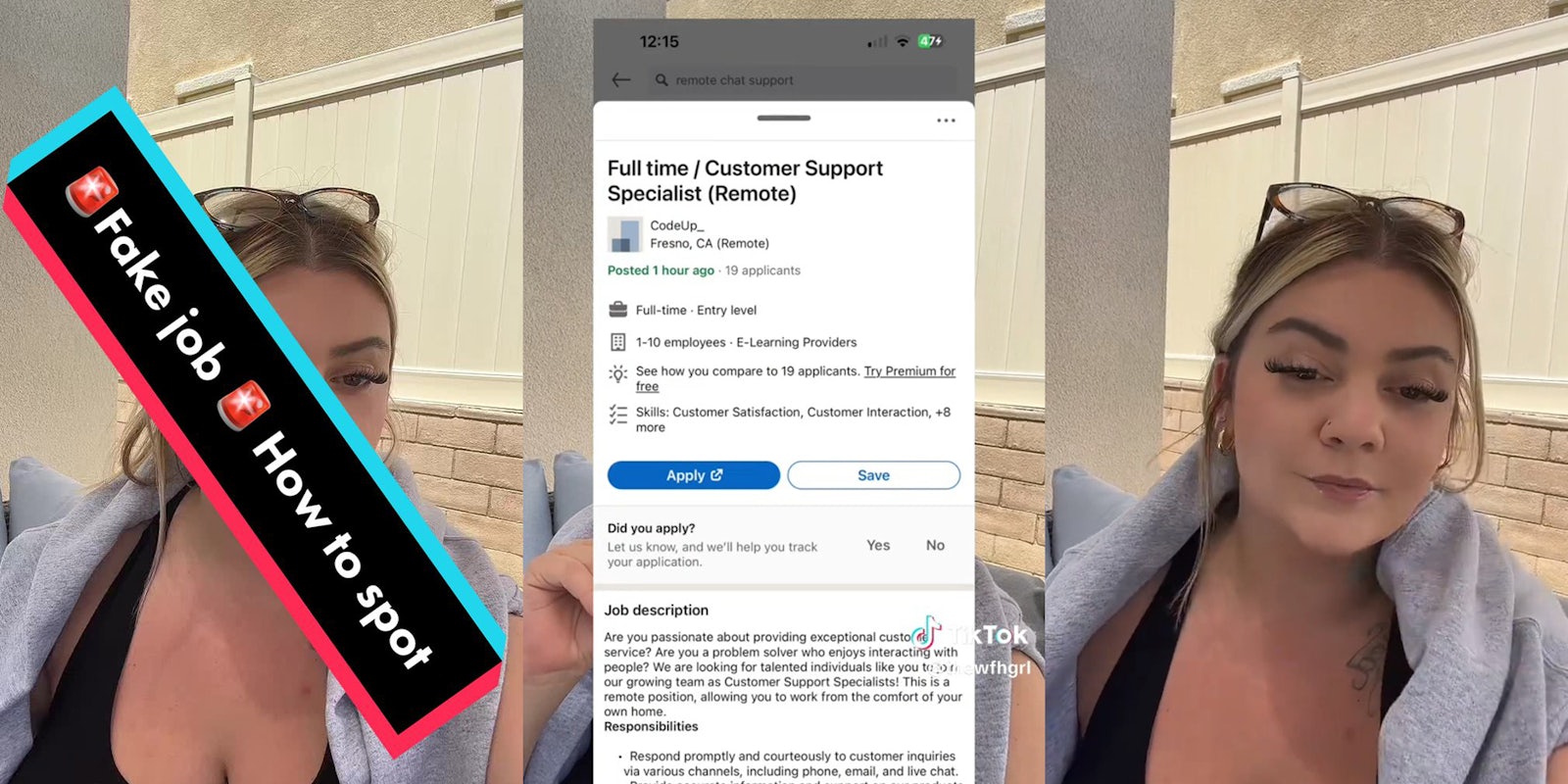Sometimes, if a job offer seems too good to be true, there’s a chance it usually is. Arguably, if there’s a position out there that pays well and offers perks you find enticing, then there’s a good chance other people do too—so why would it be freely available?
Scammers, however, know that there are folks who are desperate to land themselves that dream job, and will often use employment sites like Indeed in order to lure unsuspecting job seekers into long-form cons.
But a TikToker named Kayy (@thewfhgrl) states that she’s discovered rather easy ways to discern whether a job is a scam. She also adds that for the most part, even if a position seems iffy, she doesn’t even waste her time applying to it either.
@thewfhgrl Scam job
This is how im able to quickly differentiate a fake from real job. Quick google search, goassdoor search, compare. I hope ppl stop fallikg gor these fake jobs.. #fakejobposting #fakejobs #fakejob #wfh #wfhjobs #wfhhacks #workfromhomemom #workfromhomejobs ♬ original sound – Kayy

“This job is a scam. Watch,” Kayy says in the video. The camera then transitions to a screenshot of a job listing in Fresno, California. The position says it’s a full-time customer support specialist opportunity for CodeUp.
However, the TikToker begins to break down how she’s able to see that this gig isn’t a gig at all, but an attempt to try and screw people over.
“So it’s CodeUp, underscore, found on LinkedIn,” She says. “I thought all my girlies in the chat are having all these issues with finding fake jobs. I don’t know how but they are. Amongst many other people.”
While “CodeUp” appears to be a real company, “CodeUp_” does not, something that Kayy was able to discover after just a bit of research into the company’s background, or rather, lack thereof.
“So I type in CodeUp underscore into Google. Nothing,” Kayy explains. “CodeUp underscore in Glassdoor —nothing. CodeUp comes up on Google as an office based in Texas. See here, OK.”
She then posts a screenshot of CodeUp, which appears to be the same programming certification program that promises folks potentially better job placement opportunities should they complete their business courses.
Kayy continues in her clip, stating that this process of looking into the veracity of a business’ identity isn’t all that difficult or time-consuming.
“Then I go to the careers section and I look at all of the job postings,” she says. “They’re all in Texas. But if you see here, CodeUp_, this job is based in Fresno.”
Kayy concludes, “It took me two minutes to figure this out. Just wanted you guys to be aware because a lot of people say, ‘how do you find out if a job is real or fake?’ I just don’t apply for the ones I’m iffy about. So I wanted to share this little tidbit of information. You just have to do the research.”
The Daily Dot reached out to CodeUp via Instagram direct message and Kayy via TikTok comment.
Viewers shared their own means of ensuring that they’re applying to a legitimate job posting —heading straight to a business’ website and applying through there.
“Always best to apply on the business website instead of Indeed, LinkedIn, etc!” a user shared in the comments section.
Another commenter said the reason why job seekers are so easily tricked on job posting sites is because they’re entitled and lazy.
“That’s because they want everything on a silver platter,” they said. “A quick search is all it takes.”
One TikTok user said they were once hoodwinked into applying for a fake job because it sounded like an amazing opportunity that they just couldn’t pass up.
“Applied once to a shady job posting but turned out to be one of the highest paying job and best office culture I had in my life,” they claimed.
Someone else said they, too, noticed location discrepancies when fielding for jobs online, writing, “Ive seen postings for location-specific organizations, like within a state in the US, with remote opportunities in a small province in Canada. So sus!”



